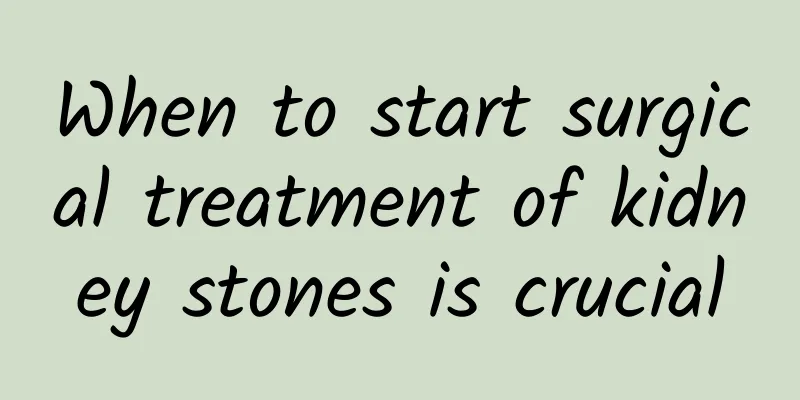When to start surgical treatment of kidney stones is crucial

|
Author: Ye Zixing Peking Union Medical College Hospital Reviewer: Xiao He, Chief Physician, Peking Union Medical College Hospital Kidney stones are one of the most common diseases of the urinary system. Many young people also suffer from them. Moreover, because kidney stones are prone to recurrence, they often accompany people throughout their lives. Kidney stones can cause unforgettable severe pain during an attack, and many people have to go to the hospital for emergency treatment. In addition, due to the popularity of health examinations, more and more people will find asymptomatic kidney stones during chest CT examinations, abdominal ultrasound or urinary system ultrasound examinations. Some of these accidentally discovered kidney stones are only a few millimeters, and some can reach 1 cm or even larger. In addition, there are many people who have lived with kidney stones for many years. The size of the stones may not change, or gradually increase; patients may be asymptomatic, or have hydronephrosis, or have attacks of renal colic, or have hematuria, low back pain, etc. Figure 1 Copyright image, no permission to reprint The course of kidney stones is insidious and long. Unless renal colic or hematuria occurs, the symptoms are usually mild and therefore often ignored by patients. There are many treatments for kidney stones, such as correcting the risk factors for stones by increasing water intake and adjusting eating habits, improving symptoms and promoting stone excretion through oral medications, and targeted drug treatment for uric acid stones, cystine stones, and infectious stones. For kidney stone patients who do not respond to drug treatment, surgical treatments can also be used, such as extracorporeal shock wave lithotripsy, ureteroscopic lithotripsy, percutaneous nephrolithotomy, and kidney stone removal. Figure 2 Copyright image, no permission to reprint Surgical treatment may cause certain side effects while removing stones, so it must be chosen with caution. So, generally speaking, what kind of kidney stone patients need surgical treatment? Whether surgical treatment is needed is determined by many factors, such as the patient's symptoms, the size and location of the stone, hydronephrosis, renal function, urinary tract infection, and previous treatment results. In short, patients with kidney stones who are not responsive to drug treatment can consider surgical treatment. Of course, the decision should be made after fully evaluating the pros and cons of surgical treatment. Generally speaking, surgical treatment can be considered for the following purposes. (1) Relieve symptoms of stones: When symptoms such as renal colic, hematuria, and low back pain caused by kidney stones continue to recur and cannot be relieved after conservative treatment measures such as medication, surgical treatment can be considered. (2) Protecting kidney function: The main purpose of treating kidney stones is to protect kidney function. When kidney stones lead to hydronephrosis or even affect kidney function, the effect of drug treatment is often poor. At this time, surgical treatment should be performed in a timely manner. (3) Treatment of secondary infection: The use of antibiotics alone is often difficult to cure the infection caused by stones. When the stone patient is elderly, has diabetes, or is in an immunosuppressive state, the infection secondary to the stone may even lead to septic shock. At this time, surgical treatment should be considered while actively controlling the infection. (4) Preventing the stones from continuing to grow: If the stones are found to be growing larger during regular check-ups or drug treatment, surgical treatment can be considered. In addition, the size of the stone is one of the factors that affect the decision to operate. It is generally believed that kidney stones with a diameter of more than 6 mm may not respond well to drug treatment, so surgical intervention is likely to be required. Although some patients have stones with a diameter greater than 6 mm, they never experience corresponding symptoms and do not affect kidney function. Considering the possible adverse reactions of surgery, regular observation can be considered for such patients with stones. In short, surgical treatment is the most effective means of treating kidney stones, and doctors will choose carefully based on the patient's specific circumstances. References Huang Jian, Zhang Xu. Chinese Guidelines for Diagnosis and Treatment of Urology and Andrology Diseases (2022 Edition)[M]. Beijing: Science Press, 2022. |
<<: Defeating the ADHD Monster
Recommend
How to deal with locust plague? Are chickens useless?
Locusts, also known as grasshoppers, are a very c...
Is it serious if pregnant women have urine protein 10?
When pregnant women go for prenatal check-ups, if...
What are the symptoms of mastitis?
In fact, the symptoms of mastitis are different a...
What is the black stuff that comes out after abortion?
If a woman wants to terminate her pregnancy and t...
What is the difference between ovulation period and ovulation day?
A baby is the fruit of love and the expectation o...
During the hottest 20 days, what three precautions should we take?
The hot summer has entered the middle of the dog ...
Is vomiting before period a sign of pregnancy?
Every woman has her period every month. Because e...
How to tighten the female vagina
For women, if the vagina becomes loose during int...
Menstrual safety period calculator table_Menstrual safety period calculator
As we all know, there is a period of safe menstru...
What causes vaginal itching?
Because the physiological structures of men and w...
Can I eat pickled pepper chicken feet during menstruation?
Menstruation is also known as monthly affairs, mo...
What does gynecological disease affect?
I believe everyone has heard of gynecological dis...









